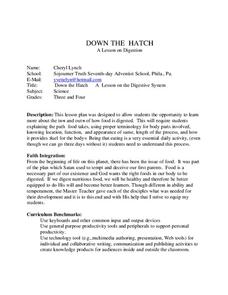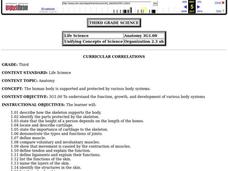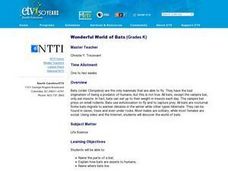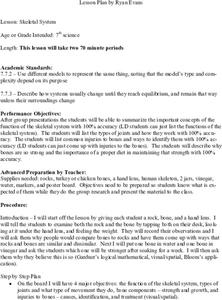NOAA
Currents
Learn how ocean currents are vital to humans and marine life. The eighth installment of a 23-part NOAA Enrichment in Marine sciences and Oceanography (NEMO) program, focuses on ocean currents and how they affect global climate. The...
NOAA
Tides
Low tides, high tides, spring tides, neap tides, diurnal tides, semidiurnal tides, mixed tides ... just how many types of tides are there? The 10th installment of a 23-part NOAA Enrichment in Marine sciences and Oceanography (NEMO)...
Curated OER
The Skeletal System
Students identify the different parts of the skeletal system. In this biology lesson plan, students put together a skeleton using an interactive website. They evaluate the accuracy of their own answers.
Curated OER
Nervous System Introductory Worksheet
For this nervous system worksheet, students answer thirty short answer questions about the structures and functions of the nervous system and its subsystems.
Curated OER
Skeletal System Song and Lesson Plans
Teachers can use a skeletal system song to help students learn science curriculum in a way that won't be easily forgotten.
Curated OER
Muscle Movements
Learners participate in a game to identify major muscle groups in the body and gain an understanding of muscle functions.
Curated OER
Down The Hatch
Students investigate how food is digested. They go through the terminology of the digestive system and follow the steps to it from beginning to end. Students use technology tools to create presentations to illustrate the functions of the...
Curated OER
Levels of Organization
Students read and complete a worksheet about the levels of organization of living things from cells to organ systems. They use a text book and the "Cells R Us" worksheet included to create a metaphor for each of the levels. They then...
Curated OER
Animals Piece by Piece
Learners sort organisms and objects into groups according to their parts and describe how the groups are formed.They identify body parts of animals from puzzle pieces, assemble the puzzle, and name the animal.
Curated OER
Insect Safari
Third graders name and identify three body parts of an insect, identify the characteristics that insects have six legs and one pair of antennae and categorize insects as to whether they are helpful or harmful.
Curated OER
Skeletal System
Third graders describe and identify the parts of the skeleton and how they support the body. They observe two chicken bones that have been soaked in vinegar for 5 - 7 days. They observe the bone's appearance after it has been removed...
Curated OER
Wonderful World of Bats
Students create a book about bats. They write a letter to a scientist containing questions about bats. They compare the socialization of bats to humans; compare the needs of bats to humans and other animals.
Curated OER
So You Think You're Tough
Fourth graders learn how to classify animals. In this invertebrates lesson, 4th graders discuss how we classify thinks into groups and move into a discussion about classifying animals. Students learn about the differences between...
Curated OER
Talking 'Bout Regeneration
Students research the regenerative capabilities of certain organisms. They present their findings at a student regeneration symposium aimed at exploring the possibilities of human regeneration.
Curated OER
Charlie and the Cell City
Middle schoolers investigate the major components of the cell and their function through an adventure inside the cell with an imaginary little guy named "Charlie." Through the use of the Internet and viewing a video, students identify...
Curated OER
Standard 4 Review Sheet-Key Ideas Biology-The Living Environment
In this living environment worksheet, students answer a variety of questions about living organisms, the processes they go through to make food and break down food, absorb nutrients, and release toxins. They explain homeostasis, they...
Curated OER
Plants and Animals, Partners in Pollination
Students participate in multiple hands-on activities to explore reproduction and pollination. In groups, using a cotton swab and powder, students simulate being pollinators and plants. They name the parts of the flowers and the function...
Curated OER
Cardiac Arrest! Using Forensics to Investigate Cardiovascular Anatomy and Function
Students identify the different parts and functions of the cardiovascular system. In this forensics lesson, students collect and analyze evidence on a fictional crime. They describe different causes of cardiac arrest.
Curated OER
Insects
Young scholars work in groups to investigate the concept of insects. They participate in a variety of activities that include the gathering of samples and making observations like identifying different body parts. The lesson integrates...
Curated OER
Skeletal System
Seventh graders explore the functions of the skeletal system. They collaborate in small groups to determine the function of the skeletal system, the types of joints and movement, bone strength and growth, and bone injuries including...
Curated OER
Defense Against Infectious Diseases
In this infectious disease defense instructional activity, learners will review the immune system including acquired, antibody, and cellular immunity. Students will then compare passive and active immunity to infectious diseases. This...
Curated OER
Circulatory System
In this circulatory system worksheet, learners use an internet program to observe the circulatory system and answer short answer questions about it. Students complete 21 short answer questions.
Curated OER
Bones: The Body's Support
In this bones activity, students compare the axial and the appendicular skeletons. Students also review the bone components. This activity has 6 matching, 8 short answer, 4 fill in the blank, and 6 true or false questions.
Curated OER
The Muscle System
In this biology activity, 9th graders define striated and identify if the muscles of chicken's leg are striated or smooth. Then they determine how the muscles of a chicken leg are attached to the bones. Students also cut muscles away...

























